2021-2022学年牛津译林版九年级上册Unit 6 TV programmes Integrated skills课件19张
文档属性
| 名称 | 2021-2022学年牛津译林版九年级上册Unit 6 TV programmes Integrated skills课件19张 |  | |
| 格式 | zip | ||
| 文件大小 | 3.7MB | ||
| 资源类型 | 教案 | ||
| 版本资源 | 牛津译林版 | ||
| 科目 | 英语 | ||
| 更新时间 | 2021-12-04 08:41:43 | ||
图片预览

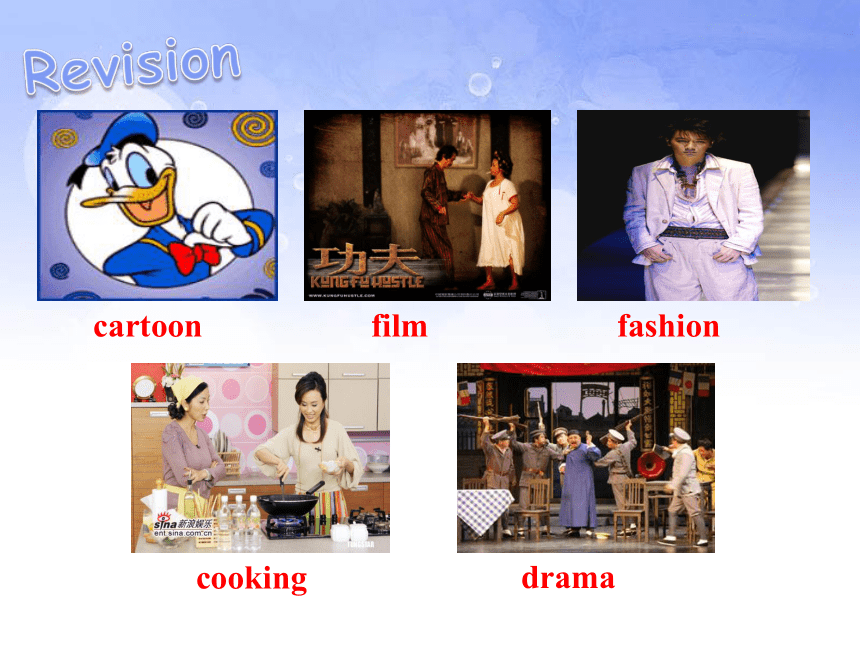
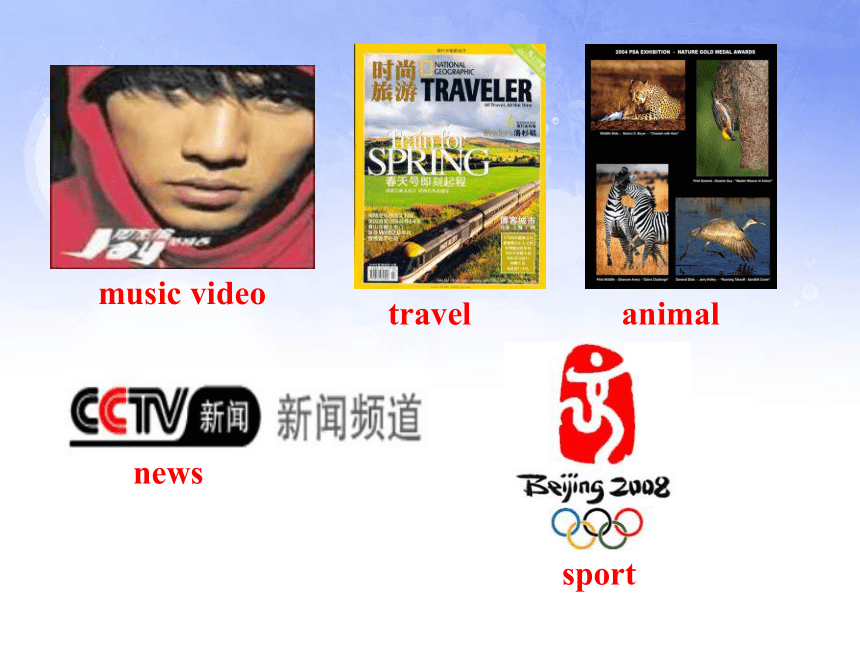
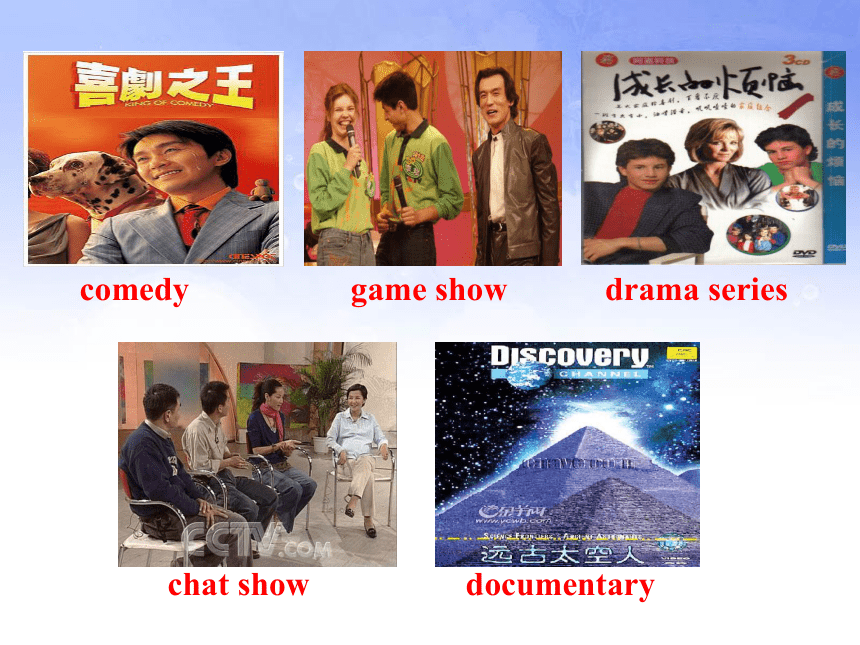
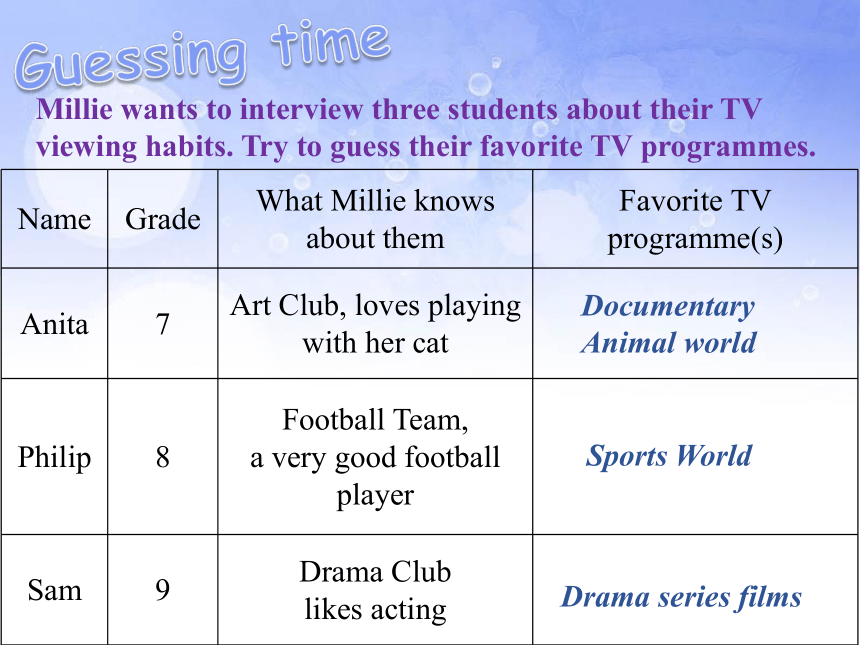
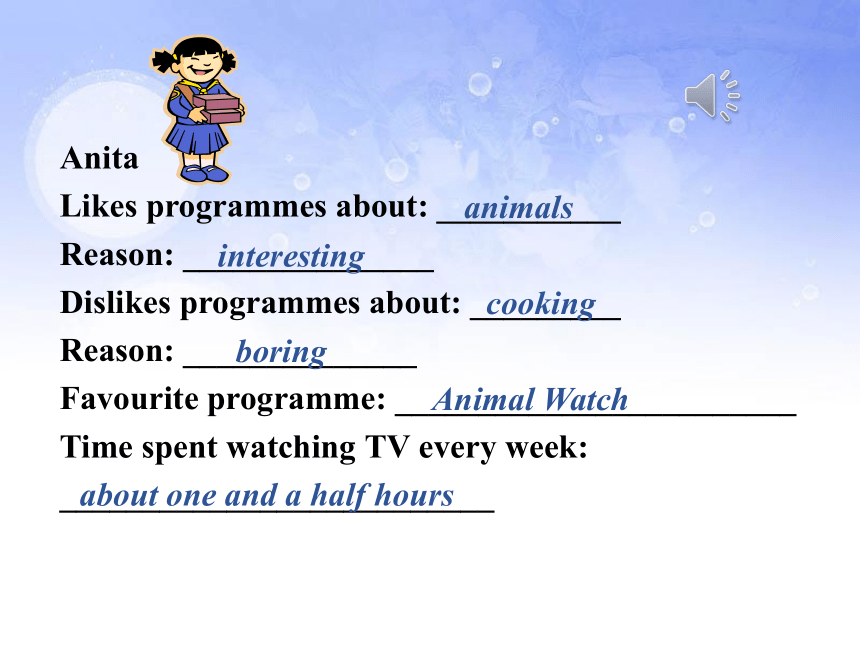
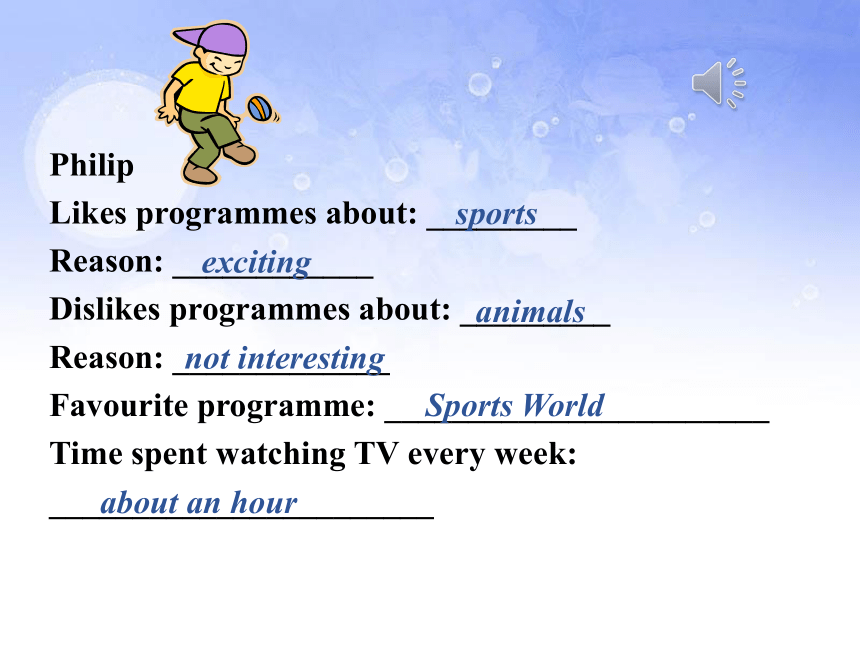
文档简介
(共19张PPT)
Unit 6 TV programmes
Integrated skills & Study skills
Revision
cartoon
film
fashion
cooking
drama
music video
travel
animal
news
sport
comedy
game show
drama series
chat show
documentary
Guessing time
Millie wants to interview three students about their TV viewing habits. Try to guess their favorite TV programmes.
Name Grade What Millie knows about them Favorite TV programme(s)
Anita 7 Art Club, loves playing with her cat
Philip 8 Football Team, a very good football player
Sam 9 Drama Club likes acting
Documentary
Animal world
Sports World
Drama series films
Anita
Likes programmes about: ___________
Reason: _______________
Dislikes programmes about: _________
Reason: ______________
Favourite programme: ________________________
Time spent watching TV every week: __________________________
animals
interesting
cooking
boring
Animal Watch
about one and a half hours
Philip
Likes programmes about: _________
Reason: ____________
Dislikes programmes about: _________
Reason: _____________
Favourite programme: _______________________
Time spent watching TV every week: _______________________
sports
exciting
animals
not interesting
Sports World
about an hour
Sam
Likes programmes about: ___________
Reason: _______________
Dislikes programmes about: _________
Reason: ____________
Favourite programme: ______________________
Time spent watching TV every week: ______________________
music
(really) fun
sports
boring
Music Videos
about half an hour
Help Millie complete the report with the information on P87.
I have interviewed three students at my school about their TV viewing habits. I found that they are different from each other.
Anita is a Grade ______ student. She is a member of the _________. She is interested in programmes about ________. Usually she spends about _____________ ______ every week watching TV. Her favourite programme is _____________. She does not like programmes about _______. She thinks they are ________.
7
Art Club
animals
one and a half hours
Animal Watch
cooking
boring
Philip is a Grade _____ student. He is a very good _______________, so he likes programmes about _____. He thinks they are very ________. His favourite TV programme is ____________. He spends about _______ every week watching TV. He does not like programmes about _________ --- he does not find them __________.
Sam is a Grade _____ student. He is a member of the ____________. He likes ______ programmes because he thinks they are really ____. His favourite programme is _____________. He watches TV for about ___________ every week. He finds programmes about ______ boring.
8
football player
sports
exciting
Sports World
an hour
animals
interesting
9
Drama Club
music
fun
Music Videos
half an hour
sports
1. Does Millie like TV ads Why
Yes. She thinks some of them are really creative.
2. What about Simon
He hates them.
3. Why does Simon hate them
He thinks most of them are silly and watching TV ads is just a waste of time.
Listen to the conversation and answer the questions.
Listen and answer
Pair work
Make up a new dialogue with your partner like this.
A: Do you like ... B: Yes. They’re ....
A: Why do you think so
B: I think some of them…. How about you
B: I hate /dislike them.
A: Why B: I think ….
Types Reason (positive) Reason (negative)
science interesting boring
news exciting meaningless
History meaningful noisy
travel fashion uninteresting
sports creative tiring
How to read a newspaper
When you read a newspaper, you should skim the headlines first. They will tell you the topic of each article.
Newspaper articles
Most
important
Least
important
Newspapers use a special style
of writing. Usually the most
important information---the
who, what, where, when and how
---comes first in an article.
The details come next, from the
most important details to the
least important ones.
1. Who was Susan Hunter
She was a poet.
2. What happened to her
She passed away.
3. Where did she die
She died in London.
4. When did she die
She died on Tuesday.
5. How did she die
She died of cancer.
Read the article on Page 89, then answer the questions.
Useful phrases and expressions
1. interview sb. = have an interview with sb. 采访某人
2. be different from each other 彼此不同
3. a waste of time 浪费时间
4. life in the countryside 农村的生活
5. grow up listening to her poems 听着她的诗歌长大
6. on the radio 通过收音机
Exercises
1. Both newspapers and websites provide the ________ (late) news.
2. Lei Feng was famous for __________ (help) others without any complains.
3. Children around the country grew up __________ (watch) her programmes on TV.
4. You will become interested in art unless you have little ________ (interesting) in it.
5. Before reading the book, you should read the __________ (introduce) carefully.
6. Have you interviewed ten students at your school about their TV _________ (view) habits
latest
helping
watching
interest
introduction
viewing
1. A cat show _______ in Shanghai last month.
A was happened B. was held
C. was taken place D. have taken place
2. A popular poet ______ cancer on Tuesday in London. She was 73.
A died off B. died of
C. died down D. died out
3. Alice is the girl _______ invention got the first prize in the school competition.
A who B. that C. which D. whose
4. None of them knew what had happened _______ they watched the news on the Internet.
A though B. when C. until D. after
Thank you!
Unit 6 TV programmes
Integrated skills & Study skills
Revision
cartoon
film
fashion
cooking
drama
music video
travel
animal
news
sport
comedy
game show
drama series
chat show
documentary
Guessing time
Millie wants to interview three students about their TV viewing habits. Try to guess their favorite TV programmes.
Name Grade What Millie knows about them Favorite TV programme(s)
Anita 7 Art Club, loves playing with her cat
Philip 8 Football Team, a very good football player
Sam 9 Drama Club likes acting
Documentary
Animal world
Sports World
Drama series films
Anita
Likes programmes about: ___________
Reason: _______________
Dislikes programmes about: _________
Reason: ______________
Favourite programme: ________________________
Time spent watching TV every week: __________________________
animals
interesting
cooking
boring
Animal Watch
about one and a half hours
Philip
Likes programmes about: _________
Reason: ____________
Dislikes programmes about: _________
Reason: _____________
Favourite programme: _______________________
Time spent watching TV every week: _______________________
sports
exciting
animals
not interesting
Sports World
about an hour
Sam
Likes programmes about: ___________
Reason: _______________
Dislikes programmes about: _________
Reason: ____________
Favourite programme: ______________________
Time spent watching TV every week: ______________________
music
(really) fun
sports
boring
Music Videos
about half an hour
Help Millie complete the report with the information on P87.
I have interviewed three students at my school about their TV viewing habits. I found that they are different from each other.
Anita is a Grade ______ student. She is a member of the _________. She is interested in programmes about ________. Usually she spends about _____________ ______ every week watching TV. Her favourite programme is _____________. She does not like programmes about _______. She thinks they are ________.
7
Art Club
animals
one and a half hours
Animal Watch
cooking
boring
Philip is a Grade _____ student. He is a very good _______________, so he likes programmes about _____. He thinks they are very ________. His favourite TV programme is ____________. He spends about _______ every week watching TV. He does not like programmes about _________ --- he does not find them __________.
Sam is a Grade _____ student. He is a member of the ____________. He likes ______ programmes because he thinks they are really ____. His favourite programme is _____________. He watches TV for about ___________ every week. He finds programmes about ______ boring.
8
football player
sports
exciting
Sports World
an hour
animals
interesting
9
Drama Club
music
fun
Music Videos
half an hour
sports
1. Does Millie like TV ads Why
Yes. She thinks some of them are really creative.
2. What about Simon
He hates them.
3. Why does Simon hate them
He thinks most of them are silly and watching TV ads is just a waste of time.
Listen to the conversation and answer the questions.
Listen and answer
Pair work
Make up a new dialogue with your partner like this.
A: Do you like ... B: Yes. They’re ....
A: Why do you think so
B: I think some of them…. How about you
B: I hate /dislike them.
A: Why B: I think ….
Types Reason (positive) Reason (negative)
science interesting boring
news exciting meaningless
History meaningful noisy
travel fashion uninteresting
sports creative tiring
How to read a newspaper
When you read a newspaper, you should skim the headlines first. They will tell you the topic of each article.
Newspaper articles
Most
important
Least
important
Newspapers use a special style
of writing. Usually the most
important information---the
who, what, where, when and how
---comes first in an article.
The details come next, from the
most important details to the
least important ones.
1. Who was Susan Hunter
She was a poet.
2. What happened to her
She passed away.
3. Where did she die
She died in London.
4. When did she die
She died on Tuesday.
5. How did she die
She died of cancer.
Read the article on Page 89, then answer the questions.
Useful phrases and expressions
1. interview sb. = have an interview with sb. 采访某人
2. be different from each other 彼此不同
3. a waste of time 浪费时间
4. life in the countryside 农村的生活
5. grow up listening to her poems 听着她的诗歌长大
6. on the radio 通过收音机
Exercises
1. Both newspapers and websites provide the ________ (late) news.
2. Lei Feng was famous for __________ (help) others without any complains.
3. Children around the country grew up __________ (watch) her programmes on TV.
4. You will become interested in art unless you have little ________ (interesting) in it.
5. Before reading the book, you should read the __________ (introduce) carefully.
6. Have you interviewed ten students at your school about their TV _________ (view) habits
latest
helping
watching
interest
introduction
viewing
1. A cat show _______ in Shanghai last month.
A was happened B. was held
C. was taken place D. have taken place
2. A popular poet ______ cancer on Tuesday in London. She was 73.
A died off B. died of
C. died down D. died out
3. Alice is the girl _______ invention got the first prize in the school competition.
A who B. that C. which D. whose
4. None of them knew what had happened _______ they watched the news on the Internet.
A though B. when C. until D. after
Thank you!
